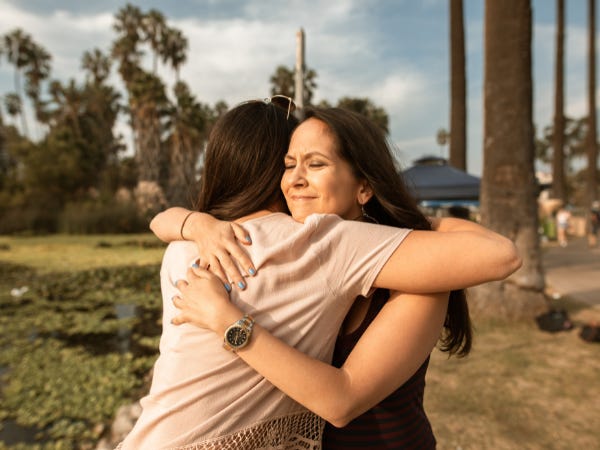Be your child’s guardrails on treacherous roads
Why holding boundaries is so important to your child’s mental health
Hello! I hope you and your family are doing well!
Boundaries are so important, especially when your child is struggling with their mental health. Why? Because boundaries help our kids feel safe and secure. And this improves every aspect of their mental health.
Think of boundaries as guardrails on a treacherous mountain road. You feel a lot better driving when the guardrails are there, right? Similarly, our kids feel a lot better when we hold parental boundaries.
But even though all parents want to hold boundaries, most parents have a really hard time doing it. Why? Not because they’re bad parents—not at all! In fact, the parents I know who struggle with boundaries are deeply empathic and loving. They want to do the best they can for their kids, and that’s exactly what makes holding boundaries so difficult.
You see, most of us want our kids to be happy. Of course we do! And when your child is struggling with an eating disorder, anxiety, depression, addiction, or other mental health situation, the drive to make them happy gets even stronger!
We just want to see our kids smile and feel good. So when they push our boundaries, we ask ourselves “Why not just give in?” After all, if they’re asking for something, shouldn’t we give it to them and make them happy? Don’t they deserve to be happy?
And the answer may surprise you. Of course you want your child to be happy! But assuming kids always deserve to be happy is actually a recipe for unhappiness. Wanting our kids to be happy can get in the way of them actually feeling happier long-term.
What actually makes kids feel good long-term is knowing they can count on their parents to handle them at their worst and most treacherous. They need us to be guardrails. Kids have a better chance of future happiness when we give them the safety and security of firm parental boundaries.
I know it’s a little counterintuitive. Most of the time when parents struggle to hold boundaries it’s because their kids keep telling them that the path to happiness and less stress is to break your boundaries. When you break your parental boundaries, your child gets an instant happiness boost and quick anxiety relief. But it doesn’t last. In fact, long term, it decreases happiness and increases anxiety.
This is backed up by scientific research. Is it true based on your own experiences as a parent?
Holding boundaries with a child who is struggling is HARD. You want to make your child happy and less anxious—of course you do! And breaking your boundaries might make your child feel happy and less anxious short term. But it won’t last. On the other hand, holding your reasonable boundaries even (especially!) when your child doesn’t want you to do so can improve your child’s long-term mental health.
Of course when you hold your boundaries your child will do everything they can to break them. They will test your boundaries over and over again. They will beg, plead, demand, and explain why your boundaries are dangerous for their mental health. They will push and push to get you to break your boundaries.
Is this a sign your boundaries aren’t working or that you should break your boundaries? No! It’s a sign that your child is testing your parental boundaries. It’s a sign that now is the time to hold steady with your boundaries.
Testing parental boundaries is perfectly natural and normal because it’s exactly how our kids learn. You don’t want to break your boundaries when your child is testing them because then your child learns that your boundaries are unstable. As a result, they will keep testing and testing, constantly seeking safety, exhausting everyone in the process.
Our kids need us to be their guardrails, particularly when the road is treacherous. When parents break their boundaries because their kids get upset when boundaries are upheld, kids end up feeling less in control, less safe, and less secure.
Our kids are constantly testing our boundaries because they want to know: can we handle them when they aren’t happy? Our kids learn to handle their big, scary feelings by seeing how we handle their big, scary feelings. If we can’t handle them when they’re unhappy, they wonder how they’re supposed to handle themselves when they’re unhappy.
Holding parental boundaries even (especially!) when our kids get upset is how we give them guardrails on treacherous roads.
Let me know if you’d like some help with this!
Ginny Jones Parent Coach / More-Love.org
New project! Recovery by Ginny Jones
New Masterclass: How to De-Escalate Tantrums
This on-demand class will teach you how to de-escalate a tantrum, whether it’s your toddler, teen, or young adult. Learn the proven method to change the dynamics and help your child learn emotional regulation.






Ginny is so right about the importance of holding boundaries in the face of our children's anxiety. She offers a great deal of wisdom